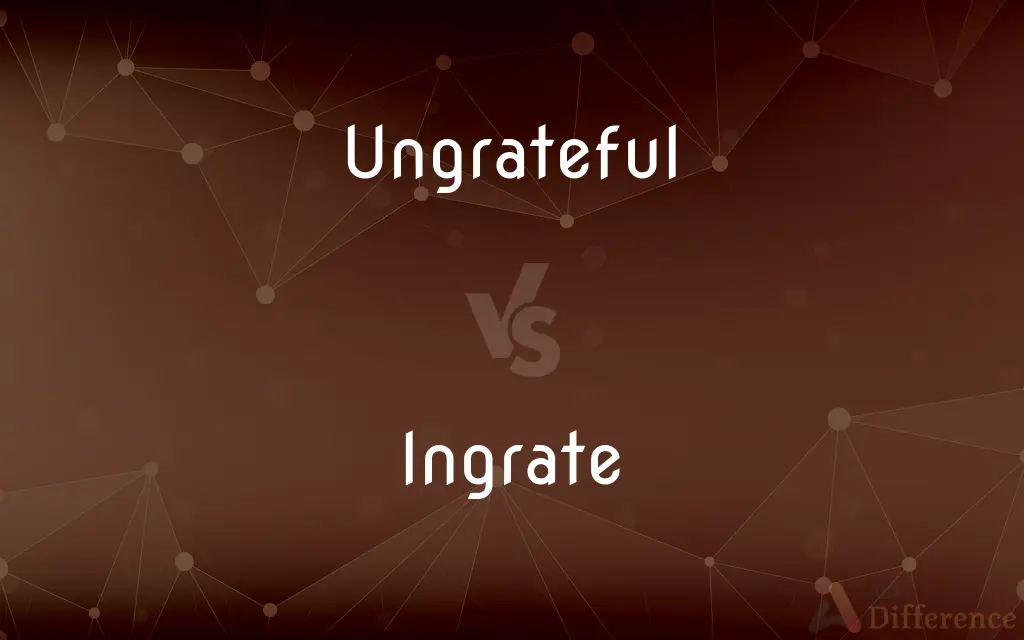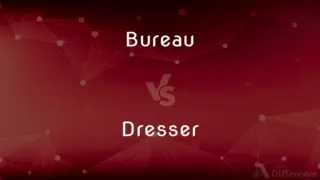Ungrateful vs. Ingrate — What's the Difference?
By Tayyaba Rehman & Fiza Rafique — Updated on April 22, 2024
"Ungrateful" describes a lack of gratitude, often seen as an attitude, while "ingrate" is a noun referring to a person who shows no gratitude.

Difference Between Ungrateful and Ingrate
Table of Contents
ADVERTISEMENT
Key Differences
"Ungrateful" is used to describe the characteristic of not showing appreciation or thankfulness for benefits received, while "ingrate" specifically labels a person as ungrateful, emphasizing their identity in relation to their behavior.
The adjective "ungrateful" can be applied broadly to actions, feelings, or attitudes that exhibit a lack of gratitude, whereas the noun "ingrate" directly addresses the individual possessing these qualities.
"Ungrateful" often appears in more general descriptions of behavior, such as in critiques of actions or attitudes, while "ingrate" is used more personally and disparagingly to criticize someone directly.
The use of "ungrateful" can be somewhat neutral, focusing on the lack of gratitude itself without an intense focus on character, whereas "ingrate" usually carries a strong negative connotation, suggesting a deep personal flaw.
In literature and speech, "ungrateful" might describe scenarios or general human tendencies, while "ingrate" is typically used in direct address or when speaking about specific individuals who fail to show gratitude.
ADVERTISEMENT
Comparison Chart
Part of Speech
Adjective
Noun
Usage
Describes behavior or attitude
Labels a person
Connotation
Neutral or negative
Strongly negative
Context of Use
General descriptions
Personal criticism
Example in Literature
"He was ungrateful for the help"
"She called him an ingrate."
Compare with Definitions
Ungrateful
Not showing appreciation.
Her ungrateful remarks hurt their feelings.
Ingrate
Someone unthankful despite receiving much.
The ingrate did not acknowledge her help.
Ungrateful
Showing ingratitude.
An ungrateful attitude can damage relationships.
Ingrate
A person who shows no gratitude.
He was labeled an ingrate after forgetting to thank his host.
Ungrateful
Failing to acknowledge assistance.
His ungrateful nature was evident when he did not thank his mentor.
Ingrate
Typically used negatively to describe ungrateful people.
His actions branded him an ingrate in their eyes.
Ungrateful
Lacking thankfulness for received benefits.
He seemed ungrateful for the opportunity provided to him.
Ingrate
Someone who fails to show proper appreciation.
Calling someone an ingrate implies severe criticism.
Ungrateful
Exhibiting a lack of gratitude.
They were ungrateful despite all the support.
Ingrate
A recipient of benefits who is unappreciative.
Known as an ingrate, he often took kindness for granted.
Ungrateful
Not feeling or exhibiting gratitude, thanks, or appreciation.
Ingrate
An ungrateful person.
Ungrateful
Not agreeable or pleasant; repellent
"I will not perform the ungrateful task of comparing cases of failure" (Abraham Lincoln).
Ingrate
Ungrateful
Ungrateful
Not grateful; not expressing gratitude.
Ingrate
(obsolete) unpleasant, unfriendly
Ungrateful
A person who fails to show gratitude; an ingrate.
Ingrate
An ungrateful person
Ungrateful
Not grateful; not thankful for favors; making no returns, or making ill return for kindness, attention, etc.; ingrateful.
Ingrate
Ingrateful.
Ungrateful
Unpleasing; unacceptable; disagreeable; as, harsh sounds are ungrateful to the ear.
Ingrate
An ungrateful person.
Ungrateful
Not feeling or showing gratitude;
Ungrateful heirs
How sharper than a serpent's tooth it is / To have a thankless child!
Ingrate
A person who shows no gratitude
Ungrateful
Disagreeable;
I will not perform the ungrateful task of comparing cases of failure
Common Curiosities
Why might someone be called an ingrate?
A person might be called an ingrate if they consistently fail to show gratitude for help or kindness, often seeming to expect or take for granted the assistance they receive.
Is "ungrateful" always used negatively?
Yes, "ungrateful" is typically used in a negative context to highlight an undesirable lack of gratitude.
How does culture impact the perception of being ungrateful or an ingrate?
Cultural expectations about gratitude can vary, and what is considered ungrateful or ingrate behavior in one culture may not be viewed the same way in another.
Are there synonyms for "ungrateful"?
Yes, synonyms include thankless, unappreciative, and unthankful.
Can "ungrateful" be rehabilitated into a positive trait?
Generally, no. The term inherently carries a negative connotation related to a lack of thankfulness.
What are the social consequences of being labeled an ingrate?
Being labeled an ingrate can lead to social ostracism, damaged relationships, and a poor reputation among peers and community.
Can organizations or groups be described as "ungrateful"?
Yes, groups or organizations can be described as ungrateful if they do not show appreciation for support or contributions from members or benefactors.
What type of behavior does "ungrateful" describe?
It describes behavior that shows a lack of appreciation or thankfulness, often in response to a kindness or gift received.
Are there synonyms for "ingrate"?
Synonyms for ingrate include thankless wretch and ungrateful person.
How might one address an ungrateful attitude in a child?
Addressing ungrateful behavior in a child typically involves teaching them the value of gratitude and encouraging them to express thankfulness regularly.
What literary works famously deal with themes of ingratitude?
Works like Shakespeare’s "King Lear" and "Cinderella" deal with themes of ingratitude and its consequences.
Can the label of ingrate be contested or disproven?
Yes, by demonstrating gratitude and changing behavior, a person can contest and potentially overturn the label of being an ingrate.
What psychological factors might contribute to someone being an ingrate?
Factors might include entitlement, narcissism, or lack of empathy, which can prevent a person from recognizing or valuing the generosity of others.
How can one stop being perceived as ungrateful?
By actively expressing gratitude, acknowledging others' contributions, and reciprocating kindness, one can change perceptions of being ungrateful.
Share Your Discovery

Previous Comparison
Bureau vs. Dresser
Next Comparison
Reindeer vs. ElkAuthor Spotlight
Written by
Tayyaba RehmanTayyaba Rehman is a distinguished writer, currently serving as a primary contributor to askdifference.com. As a researcher in semantics and etymology, Tayyaba's passion for the complexity of languages and their distinctions has found a perfect home on the platform. Tayyaba delves into the intricacies of language, distinguishing between commonly confused words and phrases, thereby providing clarity for readers worldwide.
Co-written by
Fiza RafiqueFiza Rafique is a skilled content writer at AskDifference.com, where she meticulously refines and enhances written pieces. Drawing from her vast editorial expertise, Fiza ensures clarity, accuracy, and precision in every article. Passionate about language, she continually seeks to elevate the quality of content for readers worldwide.
















































